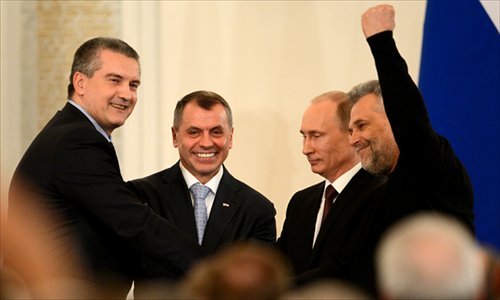Putin faces war of attrition with West

Russia’s President Vladimir Putin (second from right), Crimean Prime Minister Sergei Aksyonov (left) and other officials join hands after signing a treaty on the Black Sea peninsula becoming part of Russia in the Kremlin in Moscow on Tuesday. Photo: AFP
Russian President Vladimir Putin and the leaders of Crimea signed a treaty on Tuesday absorbing the peninsula into Russian territory. Putin told a special joint session of parliament that Crimea had always been an "inseparable part of Russia." Crimea's joining of Russia has come faster than expected.
The West supported the independence of Kosovo in the late 1990s, undermining international law. Russia and the West have been highly divided over whether Crimea's referendum is legitimate. This is a cost the whole world is paying.
The US and the EU have announced the first round of sanctions targeting Russian senior officials and oligarchs, while the Russian side only sneered at them. Whether the West can carry out further sanctions to harm the Russian economy, which will in turn harm itself, will point to how determined the West is to contain Russia.
Putin has shown his dedication to securing Russia's interests, which impressed the whole world. Will Putin behave in a "provocative" way, as the West says, in more regions such as eastern Ukraine, or will he show flexibility in his policy? This will influence the West's judgment of the strategic intentions of Moscow and of the Putin regime.
US President Barack Obama hasn't made a final decision on how to contain Russia strategically. The West has been keen on squeezing Russia's traditional domain, but it hasn't been prepared for Putin's forceful resistance this time.
Putin has smashed the West's eastward offenses that started at the end of the Cold War. The strategic boundary between Russia and the West is being redefined. Russia, which has been squeezed for a long time, has accumulated enough strength to launch a counterstrike, thus acquiring the initiative at the current stage.
However, Russia's strength is limited. It has neither the national strength of the former Soviet Union nor help from the Warsaw Treaty Organization. If the West is determined to carry out a protracted confrontation with Moscow, the latter will suffer unprecedented challenges.
Economic sanctions will lead to a lose-lose situation. The West will share the burden of economic losses, while Russia will have to undertake it alone.
Moreover, the stability of Russia is not completely guaranteed. The crisis in Crimea may trigger nationalism within Russia for a while, but when the country's tough diplomacy results in hardships for the public, the government will eventually lose support.
Putin now has the most domestic support, which gives him more room for maneuver. Moscow has taught the West and its followers a lesson, prompting the West to reconsider Ukraine's role in Europe. Putin should leave some space for the West to retreat in an elegant manner, as this will maximize Russian interests.
The West realizes that it has lost the battle for Crimea. The US and the EU should hold a serious discussion with the Kremlin regarding Ukraine's strategic position. What has happened in Crimea may be a victory for Moscow or the beginning of an endless confrontation between Russia and the West. Keeping this spat at a low intensity fits the long-term interests of Russia. Putin and his followers must have acknowledged that.
Read more in Special Coverage:
